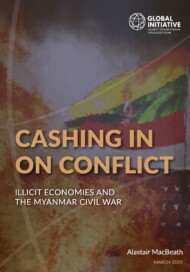Posted on 21 Sep 2017
EXECUTIVE SUMMARY
Overlaps between the world of crime (be it organised or petty) and terrorism have been documented, albeit in a non-systematic fashion, for years. In the past, the attention of experts and researchers focused on organisational “convergence” between criminal and terrorist groups. Nowadays, the focus has shifted towards individuals who move on the crime-terror continuum as both criminal groups and terrorist organisations. Both are said to be looking for similar recruits.
Our project, the biggest research effort of its kind to date, seeks to determine whether the crime-terror nexus actually exists and to investigate which types of criminality are antechambers to terrorism. It specifically focuses on individuals from 11 EU countries arrested in 2015 and convicted of terrorism offences before 31 December 2018.
This report outlines some of the challenges facing researchers focusing on the nexus, as well as our preliminary findings on overlaps between criminality and terrorism in the EU. It also offers readers a snapshot of the terrorist threat facing 11 European countries.
Some Austrian, or Austria based, foreign fighters who travelled to Syria or Iraq are said to have backgrounds in organised crime. Belgium has witnessed the development of a phenomenon referred to as “gangster jihad”, a phenomenon which is also potentially present in France, the Netherlands (more than 40% of its foreign fighters have previous criminal backgrounds) and Germany (up to 2/3 of its foreign fighters have a criminal past). A “gangster jihadi” is an individual who almost naturally drifts from the world of crime towards jihadism, sometime as a form of redemption for his earlier sins. He, as the phenomenon is almost exclusively male, possesses links and skills which allow him to thrive in both, seemingly, divided worlds of crime and terrorism.
We also expect this phenomenon to become even more pronounced in France, where an estimated 60% of incarcerated radicals are predicted to return criminal-infested terrorist networks by 2020. With up to 1/3 of its convicted terrorists having previous criminal backgrounds, Spain has a long standing tradition of individuals shifting between ordinary criminal and terrorist milieus, dating back to at least the 2004 Madrid attacks. Significant traces of the nexus can also be found in the UK, where we are also mindful of evidence suggesting peer-to-peer recruitment into jihadism of individuals without criminal pasts.
Finally, there exist a number of seemingly odd, and to an extent outlier cases, in Italy (where traces of an old school nexus on an organisational level are still to be found), Ireland (where ordinary crime seems to have long overtaken terrorist networks), Greece (where the crime-terror nexus better fits left-wing rather jihadi terrorism) and Bulgaria (where the threat of terrorism is largely connected to foreigners residing, passing through or eventually expelled from the country).



